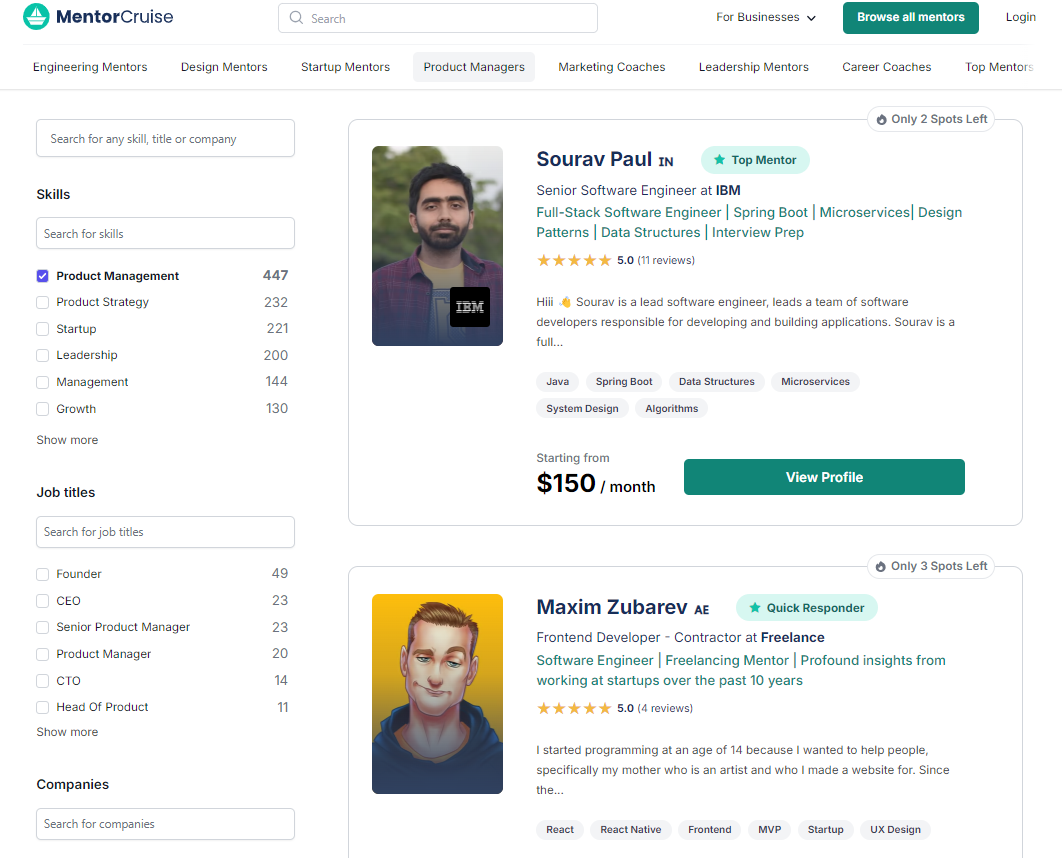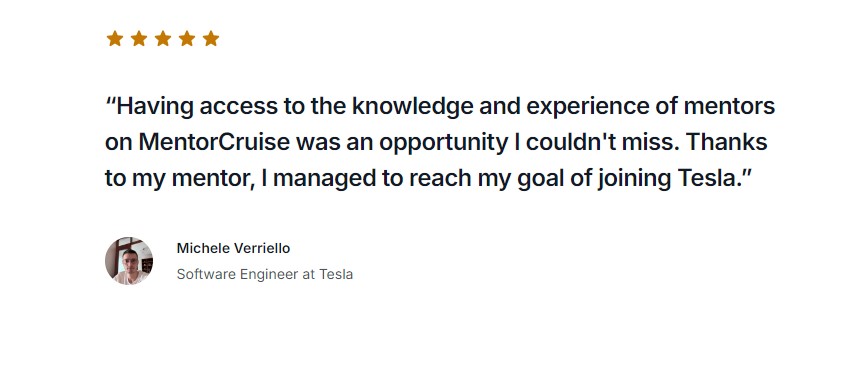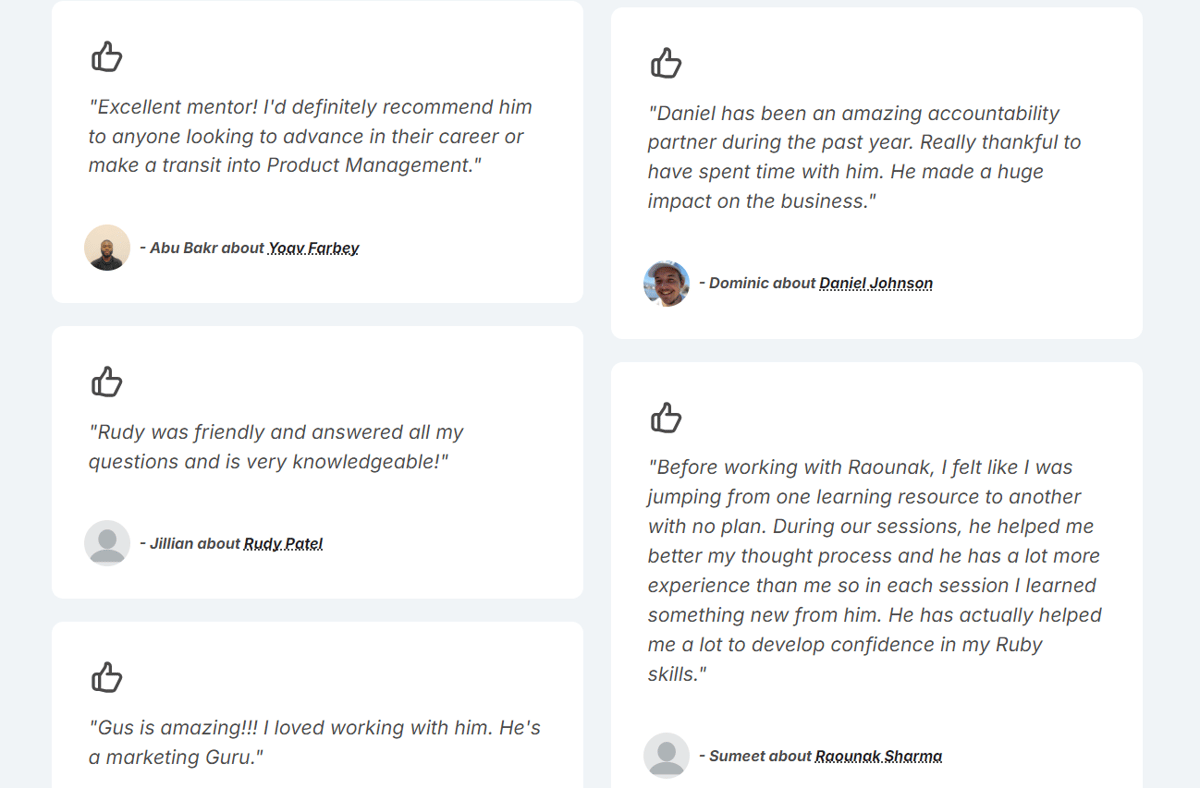With this demand on the rise, becoming a product management coach offers a rewarding opportunity to use your expertise and help others succeed.
Fortunately, in this MentorCruise guide, we will explore:
- What a product management coach is
- Different types of product management coaches
- Examples of successful product management coaching
- Why product management coaching is important
- How to become a product management coach
- Best practices for a product management coach
What is a product management coach?
A product management coach is a seasoned professional who aids others in mastering the skills and knowledge needed in product management. They provide personalized guidance, from product discovery to strategy implementation, helping clients enhance their abilities and advance their careers.
Unlike general career coaches, product management coaches specialize in areas specific to product development, making them a requisite for those wanting to excel in this field.
Different types of product management coaches
- Strategic coaches: These coaches focus on helping clients develop long-term product strategies by setting vision, defining product roadmaps, and aligning products with business goals.
- Tactical coaches: They specialize in the day-to-day aspects of product management, such as prioritization, backlog management, and execution. Tactical coaches help clients improve operational efficiency.
- Leadership coaches: They guide clients in developing leadership and team management skills. Leadership coaches are perfect for product managers transitioning into leadership roles or managing larger teams.
- Market coaches:These coaches provide expertise in market analysis, customer insights, and competitive positioning, helping in strategic market entry and product positioning.
- Innovation coaches: These coaches foster creativity and innovation, encouraging their clients to try out new products and manage risks associated with new ideas.
At MentorCruise, we have expert product management coaches ready to help you overcome the challenges of managing and growing your product. Our coaches bring extensive industry experience and offer 1-on-1 mentorship to your specific needs.

Whether you're refining your product roadmap, optimizing development processes, or expanding your market reach, our coaches are here to help you achieve sustainable success.
Examples of successful product management coaching

Case study
Michele began at a small university in southern Italy, far from the world's top academic institutions.
Recognizing the need for personal growth and better career opportunities, Michele leveraged the strategic planning, continuous skill development, and targeted mentorship offered by our product management coach Davide Pollicino.
His guidance helped Michele secure an internship at Tesla, showing the power of personalized mentorship in achieving significant career milestones.
Statistics
At MentorCruise, we have a 96% satisfaction rate among our users, indicating high levels of mentee satisfaction with the mentorship they receive. Our mentors have received an average rating of 4.9 out of 5 from mentees, reflecting the high quality of mentorship provided.
Why product management coaching is important
Product management coaching is crucial in developing and enhancing the skills of product managers. Here's why it's important:
Skill enhancement
Coaching can help clients master skills like market analysis, product strategy, and user experience design to create successful and competitive products.
Objective feedback
Clients can get unbiased, constructive feedback through coaching, helping them identify blind spots and areas for improvement. This is key in refining strategies and processes.
Career advancement
Product management coaches guide clients through career challenges and transitions, setting professional goals, and achieving growth, aiding both aspiring and current product managers to advance in their careers.
Increased accountability
Coaches hold clients accountable for their goals and actions, ensuring consistent progress and maintaining focus. This helps clients stay committed to their development plans.
Customized learning
Product management coaches provide personalized mentoring that caters to the specific needs and goals of the individual or team. This targeted approach speeds up the learning process.
Confidence building
Through guidance and support, coaches help clients build confidence in their decision-making and leadership skills. This is key to driving innovation and taking calculated risks.
How to become a product management coach
- Gain extensive product management experience
To become a successful product management coach, you need to have a robust background in product management. This can provide the foundation for offering practical and relevant advice.
Steps to gain experience:
- Work as a product manager: Start in roles where you can manage products directly, ideally at reputable companies. Getting exposed to different industries and products can enhance your understanding.
- Engage in diverse projects: Involve yourself in projects around various aspects of product management, such as product discovery, development, and launch. This can broaden your expertise and make you versatile.
Benefits of experience:
- Practical insights: You can understand common challenges and effective solutions by gaining real-world experience.
- Credibility: A solid track record adds to your reputation and appeal to potential clients.
- Develop specialized knowledge
Specializing in certain areas within product management can set you apart in the coaching field. Focus on your strengths and passions to carve out a niche.
Areas of specialization:
- Product discovery: Master techniques needed to identify market needs and validate product ideas.
- Product strategy: Create comprehensive product visions and roadmaps aligned with business objectives.
- Team leadership: Develop skills in managing cross-functional teams and promoting collaboration.
- Enhance your coaching skills
Effective coaching goes beyond product management knowledge— it requires strong interpersonal skills too.
Key coaching skills:
- Active listening: Engage fully with clients, understanding their needs and concerns without interruption.
- Effective communication: Give clear advice, strategies, and constructive feedback.
- Constructive feedback: Provide actionable, supportive critiques to help clients get better.
Professional development:
- Certification programs: Consider formal coaching certifications for more credibility.
- Workshops and seminars: Attend events focused on coaching methodologies to refine your approach.
- Stay updated with industry trends
Product management is a dynamic field, so you need to stay informed about the latest trends and tools.
Ways to stay updated:
- Read industry content: Regularly read blogs, articles, and books relevant to product management.
- Attend conferences and webinars: Participate in industry events to learn from experts and network with peers.
- Engage with professional networks: Join online forums and professional groups to stay connected and informed.
- Offer personalized coaching services
Tailor your coaching services to address the unique needs of each client, increasing the relevance and impact of your guidance.
Types of coaching services:
- One-on-one coaching: Provide 1-on-1 sessions to focus on specific client needs.
- Group sessions: Conduct workshops or group coaching for teams, addressing common challenges.
- Specialized programs: Design programs for particular scenarios, like onboarding new product managers or helping with quick discovery sessions.
- Create a clear value proposition
Clearly articulate what sets your coaching apart and the benefits clients can expect. This helps attract clients by showcasing your unique value.
Key elements of a value proposition:
- Your strengths: Highlight your unique skills and experiences.
- Problem solving: Specify the issues you can help clients overcome.
- Benefits: Outline both tangible (e.g., improved product market fit) and intangible (e.g., enhanced leadership skills) outcomes clients can achieve.
- Set up a professional platform
Don’t underestimate the power of a strong online presence in reaching potential clients and establishing credibility.
Steps to build your platform:
- Professional website: Create a website detailing your services, background, and client testimonials.
- Social media profiles: Maintain active profiles on LinkedIn, Twitter, and other relevant platforms.
- Join coaching platforms: Consider using platforms like MentorCruise to connect with clients and promote your services.
- Determine your pricing and packages
Offer a range of pricing options to cater to different client needs and budgets, which in turn can reflect your expertise and the value you provide.
Pricing options:
- Hourly sessions: Ideal for clients seeking short-term guidance or specific advice.
- Monthly subscriptions: Provide regular coaching sessions with ongoing support.
- Comprehensive programs: Offer in-depth coaching packages focusing on specific areas of product management.
Best practices for a product management coach
Set clear goals
Work with clients to define SMART goals (Specific, Measurable, Achievable, Relevant, Time-bound). For instance, the product's Net Promoter Score (NPS) can be increased by 10% within three months by implementing three key feature improvements based on customer feedback to enhance market fit.
Stay open to feedback
Encourage your clients to provide feedback on your coaching methods. Use this input to refine your approach and better meet their needs.

Maintain consistency
Regularly review progress and adjust strategies as needed. Consistent coaching helps clients develop habits and skills for long-term success.
Build strong relationships
Foster a trusting and open relationship with clients to make room for honest communication and a deeper understanding of their challenges.
Use data-driven approaches
Use data and analytics to keep track of progress. This can help you give clear assessments and personalized advice to your clients based on real results.
Encourage self-reflection
Promote self-reflection to help clients recognize their strengths and areas for improvement, which can encourage their personal and professional growth.
Provide actionable advice
Suggest specific, actionable steps that clients can implement immediately, and avoid vague advice.
For instance, To improve customer onboarding, immediately implement a step-by-step tutorial within the app that guides new users through the main features, and set up an automated follow-up email with additional tips and resources one week after sign-up
Prioritize continuous learning
Encourage clients to stay updated with industry trends and best practices, which can help them adapt to the dynamic product management field.
Challenges you may face as a product management coach
Making sure everyone's on the same page
You may often have to balance the different expectations of customers, executives, and team members of your client. When these groups have different priorities, you might get frustrated and start slacking.
Solution: Communicate openly and make sure everyone understands the goals. Use frameworks like Objectives and Key Results (OKRs) to set clear objectives. Regular check-ins can help everyone stay on the same page and quickly address any issue.
Managing communication across teams
Poor communication between departments like product management, engineering, and marketing can lead to misunderstandings and slow down product development.
Solution: Encourage collaboration and create ways to share information across teams. Hold regular meetings and keep everyone updated. You can also use online platforms that make it easier to communicate.
Navigating engineering dependencies
As a product management coach, you may depend on engineering teams to bring their ideas to life. This can create delays, especially if the engineering team is busy with other projects.
Solution: Build good relationships with the engineering team and involve them early in planning. Set clear timelines and be flexible with priorities based on available resources.
Prioritizing the product roadmap
Deciding which features to focus on can be tough, especially with different stakeholders with different targets. Without a clear strategy, making the best decisions can be hard.
Solution: Use data from customer feedback, market research, and strategic goals to prioritize features. Keep the roadmap up-to-date with the latest priorities and insights.
Getting and using customer feedback
Getting customer feedback and using it effectively can be hard, especially if there’s a lot of data. Even worse, misinterpreting feedback can lead you to poor choices about the product.
Solution: Gather feedback from different places and use tools to spot patterns and insights. Promote a culture of experimenting and be willing to adapt based on what customers say to make the product better.
Keeping up with market changes
Product management requires staying up-to-date with market trends and customer needs. Not keeping up can make your client miss opportunities or design products that no longer fit the market.
Solution: Continuously research the market and encourage your client to stay informed about industry changes.
Accelerate your journey of becoming a product management coach with MentorCruise
Becoming a product management coach is a fulfilling career that allows you to use your expertise to help others succeed.
Gain relevant experience, develop specialized knowledge, and hone your coaching skills to build a successful coaching practice. With a clear value proposition and a professional platform like MentorCruise, you can attract and retain clients effectively.
Unlock your coaching potential and empower product managers to shine in their sphere by joining MentorCruise today.







